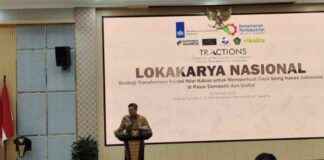The recent Conference of Nahdlatul Ulama (NU) in 2025, held at the Sultan Hotel in Jakarta on February 5-6, 2025, has put forth a critical recommendation to the government. The conference emphasized the urgent need for a comprehensive strategy to address violence in educational institutions, including pesantrens. Rumadi Ahmad, the Chair of the NU Recommendation Commission, highlighted the importance of orchestrating this grand strategy by enhancing participation and partnerships with religious and civil society institutions.
Amidst a backdrop of escalating violence in educational settings, NU called for law enforcement agencies to swiftly, fairly, and objectively handle cases of violence in educational institutions, including pesantrens. The NU leadership urged the formation of a Task Force to Combat Violence in Educational Institutions to complement existing Task Forces addressing violence in pesantrens. Additionally, they emphasized the need to facilitate and accelerate the implementation of a Roadmap for Combating Violence in Pesantrens.
In recent times, society has been grappling with a concerning rise in cases of violence in educational institutions, particularly in pesantrens. According to data from the National Commission on Violence Against Women (Komnas Perempuan), reports of sexual violence in pesantrens ranked second highest after incidents in higher education institutions. A Content Analysis study of media coverage revealed that over the past year, there were more than 90 cases of violence in pesantrens, with 72 percent of them involving sexual violence (data from Saka Pesantren PBNU).
The reverberations of violence in educational institutions, including pesantrens, are amplified by the power of social media. People are becoming more aware of regulations but are also increasingly reactive and impatient when it comes to sensitive issues like violence in educational institutions. Reports of vigilante justice against perpetrators or the institutions supporting them have further exacerbated the situation, impacting not only the victims but also tarnishing the reputation of educational institutions, particularly religious ones like pesantrens.
Despite various efforts by the government to address these challenges, significant changes have yet to materialize. Initiatives such as combating the Three Major Sins of Education by the Ministry of Education, the Child-Friendly Pesantren policy by the Ministry of Women’s Empowerment and Child Protection (KPPPA) and Ministry of Religious Affairs, and other regulations have not yielded the desired results. A more effective, efficient, and immediate approach is needed to tackle this issue.
NU has made a specific commitment to combat violence in educational institutions under Muslimat NU, LP Maarif NU, and LPTNU, as well as in pesantrens under the auspices of Rabithah Ma’ahid Islamiyah (RMI). This multi-faceted approach requires collaboration from various stakeholders, as NU cannot address this issue alone. As an initial step, PBNU has taken several initiatives, including appointing a Task Force, organizing PBNU Syuriyah Halaqah with religious leaders, establishing the Task Force for Combating Violence in Pesantrens (SAKA Pesantren), and developing a Roadmap for Transforming the Culture of Non-Violence in Pesantrens to address violence in educational institutions and pesantrens under its umbrella.
However, a systematic multi-stakeholder approach is essential. “The state must be present to orchestrate the grand design of the strategy to combat violence in educational institutions, especially pesantrens,” emphasized Rumadi. This comprehensive strategy is vital to ensure the safety and well-being of students and individuals in educational settings.














